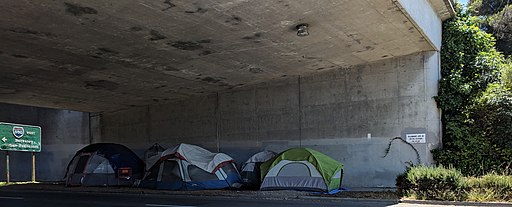By Pallavi Panyam
Ian Bertrando is a fourth-year student at UC Berkeley. He is majoring in philosophy and legal studies and minoring in global poverty and practice. This summer, he worked as a Public Policy Intern at the Coalition on Homelessness, where he worked on the San Francisco Proposition C campaign. Proposition C, also known as the “Our City, Our Home” ballot measure, would levy a tax on revenue from companies that make over fifty million dollars to fund different homeless services.
The proposition creates five different tax brackets depending on the business sector; on average, eligible companies would pay a 0.5% tax. This is estimated to bring in between 250 and 350 million dollars in revenue. Of this money, 50% would go towards establishing permanent housing, 25% towards mental health and substance abuse services, 10% towards expanding the existing shelter system and emergency services, and 12% to eviction prevention for people at risk of losing their current homes.
Unlike many previous homelessness initiatives, Proposition C came entirely from the community. Ian explains, “Generally, a lot of policy is written by politicians, like the board of supervisors. But this was written by a collective of homeless service providers. It was a voter-driven initiative. It was from a collection of homeless service providers, GLIDE Memorial Church, the Coalition on Homelessness, the Key Foundation, and Larkin Street Youth.”
Homelessness is a cause close to Ian’s heart. He grew up in San Luis Obispo, California, and while he attended community college there, he worked at Options, a care home for individuals with developmental disabilities and traumatic brain injuries. He described his involvement at Options and how it changed his perspective. “I worked there for two years while going to community college. Working with a lot of those people at care homes and teaching them basic life skills, there’s a lot of overlap in mental health, developmental disabilities, TBIs, and homelessness because if you can’t take care of yourself, you’ll end up homeless if you don’t qualify for one of the services that we were providing. I had a lot of clients who had previously experienced homelessness or substance abuse problems, and it’s all intersectional. So, that’s why I wanted to kind of tackle this because I thought it’s something that’s too prevalent given that these people can’t help themselves. They don’t have services available to help them.”
Working at the care home showed Ian firsthand the vicious cycle that is fed by the overlap between mental health, injuries, substance abuse, and homelessness. This experience, as well as his background in the global poverty minor studying the systemic and structural causes of homelessness, led Ian to join the Coalition.
The Campaign
Generally, Proposition C had a lot of support from the community. The main opposition to the measure came from the San Francisco Chamber of Commerce, but the campaign also had to combat prevalent anti-homeless rhetoric and ingrained attitudes.
Ian described the various reactions that community members had to the ballot measure “had to frame our message differently for different people.” Some people already believe that homeless people have a right to be housed, while they convinced others in more affluent and conservative areas to support the measure to clean up the visible aspects of poverty and homelessness.
Part of the campaign’s work was to combat persistent myths about homelessness in the city. Governor Gavin Newsom came out against Proposition C, claiming that increasing services would attract more homeless people to San Francisco. The idea of a “homeless magnet” is a common argument, but it is false. In fact, 70% of currently homeless people in the city lived in San Francisco before losing their homes, and another 15% moved from other parts of California. Ian also noted that members of the LGBTQIA community are overrepresented in the San Francisco homeless population. Many of them came to San Francisco searching for a safe space to exist. In a way they are internal refugees; they aren’t coming for services. In fact, San Francisco has some of the worst homeless laws; there are over twenty-five “quality of life laws” that are used to punish people for being homeless.
High-Profile Support
A turning point of the campaign was when tech billionaire and Salesforce CEO Marc Benioff came out in support of Proposition C. This support came about organically; a campaign supporter replied to one of Benioff’s tweets and began a conversation to convince him of the benefits of the proposition. After the exchange, Benioff not only endorsed the campaign but emerged as a strong advocate for the measure. His support catapulted the campaign to national news in addition to providing much-needed financial support.
“We struck gold when we got Marc Benioff from Salesforce to endorse us. He ended up donating seven million to the campaign. Once we got his endorsement it went from being a small, barebones campaign to this bustling thing with two offices and space in the Salesforce tower. We got his endorsement because a small business owner got into a Twitter back-and-forth with him, and she convinced him that this was the best bet to adequately address homelessness. We were polling favorably before he endorsed us, but the resources he provided were beneficial to getting to that 60%. It was like David and Goliath, and then we got Goliath on our side.”
Outcome
On election day, Proposition C passed with 60% of the vote, but the fight is not quite over. Currently, the measure faces the danger of a lawsuit regarding an ambiguous California state law that requires a two-thirds majority instead of a simple majority to enact a specialized tax toward a dedicated fund. Proposition C from the June election, a different proposition that passed with a narrow margin, is tied up in the courts right now for the same reason. A previous state supreme court ruling declared that voter-driven initiatives only need a simple majority to pass, and the campaign is hopeful that the current courts will uphold this precedent. If Proposition C does pass, it will likely be a couple years before we start to see impacts. “It’s currently tied up in the courts right now,” Ian explains. “Until we get a ruling, tax is being collected but the city is holding the money in case the proposition is ruled unconstitutional. We expect it not to go into effect for a year or two. It’s really ridiculous that the resources are there, the tax is there, and we’re just tied up in the courts. It’s really frustrating since it’s definitive that the voters support this. Every new week you see an article about homelessness in San Francisco; it’s infamous.”
So, it remains to be seen whether Proposition C will bring its promised results and be the long-awaited solution to the homelessness crisis. The campaign, however, has already made a mark on the city by proposing the role big business should play in solving homelessness. Tech companies bring in thousands of workers with relatively high incomes; this has led to skyrocketing house prices and the displacement of many marginalized tenants. The city is gentrifying rapidly and could soon become affordable only for tech workers. “It’s like one city built off another,” Ian observes. “They’re living in their own world when everyone else is struggling to get by.”
As the housing crisis grows, it’s becoming more apparent that corporations must do something to address the problems they helped create. San Francisco is one of the wealthiest cities in the world, but it hasn’t done enough to protect its residents. Measures like Proposition C are necessary to keep the city accessible and affordable for its most vulnerable residents.
Ian’s involvement in homelessness and housing isn’t over with the campaign. He hopes to become a lawyer and focus on social justice issues, possibly continuing as an advocate for homeless rights. “Homelessness and housing rights are human rights. It’s insane that we have all the resources needed to house everyone but fail to provide fundamental basics to our people. The only reason why homelessness continues to exist in the US is a combination of greed and negative public perception driven by false narratives that are spread to strip folks experiencing homelessness of their humanity.”








Be First to Comment